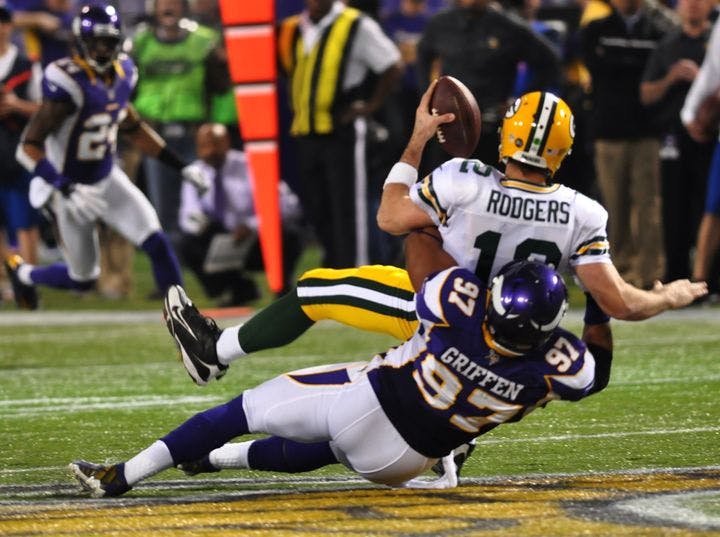Winter 2013
Does watching football take away our compassion?
– The Wilson Quarterly
Knowing the physical toll the game takes, is it ethical to be a fan?
Football is the new gladiatorial combat, and players bear the wounds to prove it.
Sixty-three percent of National Football League players sustained an injury of some sort during the 2010 season. One in 20 suffered at least one concussion, an injury which, if incurred repeatedly, is linked to cognitive and emotional problems that appear years after players hang up their cleats.
Benjamin J. Dueholm, a Lutheran pastor in Wauconda, Illinois, and a die-hard Green Bay Packers fan, loves the gridiron. But he argues that it’s time for American Christians to take a long look at the damage done by the game.
It wouldn’t be the first time Christians have cried foul on popular sport, Dueholm notes. Church fathers objected to violent spectacles in ancient Rome, not least the bouts between gladiators. “The man who when he sees a quarrel on the streets coming to blows will try to quiet it,” wrote the early Christian theologian Tertullian, “will in the stadium applaud fights far more dangerous.” Tertullian mourned the fate of the bloodied gladiators, many of whom were criminals serving out sentences. Like Augustine, another Church Father, Tertullian worried that the deadly games desensitized eager onlookers and stripped them of compassion.
Dueholm argues that the same spiritual and, particularly, physical concerns apply to America’s most popular sport. Some 67,000 high school football players suffer concussions every year, according to official tallies, and many more concussions go unreported. At the youth and college levels, moreover, players receive no salary or health benefits.
At the professional level, thousands of former NFL players and their relatives have recently filed scores of lawsuits against the league for treating concussions too lightly and withholding information linking head trauma to long-term cognitive ailments. The worst of these is chronic traumatic encephalopathy (CTE), a degenerative brain disease. Through brain autopsies, more than 30 former NFL players have been posthumously diagnosed with the disease. Several affected players have committed suicide. One of them, Dave Duerson, a retired safety for the Chicago Bears, shot himself in the chest in 2011 in the tragic hope that research could be advanced through study of his brain. An autopsy confirmed that he had had CTE.
Spectators are affected, too. One study found that fans derive particular enjoyment from matchups that are perceived to have higher levels of violence. “Sensation-seeking” football viewers in a different study showed a spike in stimulation during violent plays. Those plays can make for incongruities, especially for Christians who preach peace. “I have more than once noticed myself reproaching my children for garden-variety squabbling,” Dueholm admits, “even as we watched [Packer linebacker] Clay Matthews land a bone-jarring hit on a quarterback.”
As “the central liturgical act of American civic religion,” football unites people of all stripes in a way that few national rituals do, Dueholm writes. Nonetheless, he warns, “the time may have come for Christians to exercise what remains of our culture-shaping power by turning away from a game whose dangers are grave even as their extent is not fully known.”
THE SOURCE: “Unnecessary Roughness: The Moral Hazards of Football” by Benjamin J. Dueholm. The Christian Century, Sept. 19, 2012.
Photo courtesy of Flickr/Joe Bielawa
